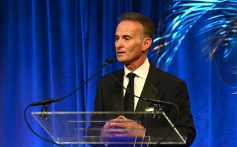finance
Trending on Billboard
Xposure Music, a Canadian catalog firm focused on mostly independent artists, said on Monday it secured $42.5 million in debt financing from billionaire hedge funder David Tepper‘s Andalusian Credit Partners and private investors.
Xposure co-founders and co-CEOs Ryan Garber and Gregory Walfish said they have signed over 100 deals with independent and some major label artists worth between $10,000 and $4 million since starting Xposure in 2021. Their firm’s total funding now tops $50 million and includes support from equity investors including Garber’s father, former Cirque du Soleil chairman and a minority owner of the Seattle Kraken Mitch Garber.
Related
In recent years, the billions invested by global asset managers and private equity firms to acquire the rights to music’s most popular songs has prompted smaller investors to exploit their specialized genre knowledge and industry connections to acquire music IP in a niche category.
Major funds doing this include Beyond Music, which acquires K-pop and evergreen Asian music catalogs, Cutting Edge Media, which owns media music rights used by the film, TV and wellness industries, and Duetti, which also buys master recordings and publishing rights from independent artists.
“Our goal is to continue to serve as the gateway for emerging artists to access meaningful funding and take their careers to the next level, and this investment gives us the resources to make that possible,” Garber said.
Xposure’s Walfish tells Billboard the initial idea was to create a platform for artists to submit music, pay a fee and be guaranteed that their music would be heard by a record label. While they had early success — signing up nearly 25,000 artists and 200 record label executives — Walfish said it led them to discover that what artists really needed was financing for future projects. Xposure pivoted to catalog acquisitions and other financing options in November 2023. Walfish says Xposure’s acquisition deals with artists are flexible, with Xposure buying entire catalogs of master recordings, publishing rights and writer’s share in perpetuity, or fractions of the artists’ rights to albums or individual songs. Xposure also offers term advances.
“More options for artists are better because they are not forced to take a crazy record deal, and in our underwriting and due diligence, we see some crazy deals,” Walfish says. “Music has become a great asset class recognized by a lot of people, but … this is peoples’ life work that they’re entrusting you with. We want to build relationships with the artists we work with.”
With this new financing, Xposure aims to selectively expand their portfolio holdings and catalogs in new genres like Latin and K-Pop, to further develop their in-house valuation tools, and explore more strategic partnerships, like the one they have with indie distributor Too Lost. That partnership, announced in October, will help accelerate distribution of the catalogs Xposure has rights to and help it acquire new ones, the company has said.
Trending on Billboard
StubHub has been hit with a class action lawsuit alleging the secondary ticketing company hid key cash flow changes from investors who bought into its $758 million initial public offering (IPO) in September.
The legal complaint, filed in New York federal court on Monday (Nov. 24) by class action law firm Glancy Prongay & Murray, is the first of what’s likely to be multiple lawsuits stemming from StubHub’s disappointing third-quarter earnings report. At least four other law firms have announced that they’re also investigating the company’s numbers.
Related
Monday’s lawsuit was brought on behalf of Daniel Salabaj, an investor who bought StubHub stock during its IPO on Sept. 17. StubHub sold roughly 34 million shares that day at $23.50 a pop, netting $758 million after underwriter discounts and fees.
StubHub released its first earnings as a public company on Nov. 13, and some of the numbers were less than optimal. The company revealed that it had free cash flow of negative $4.6 million that quarter, down from a positive $10.6 million in the same period a year earlier. The market reacted negatively, with the StubHub stock at one point tumbling as low as $10.31 per share, a 56% decline from the IPO price.
Salabaj’s lawsuit alleges he and other investors were blindsided by the news of StubHub’s cash flow decrease, which the company attributed to changes in its vendor payment schedules. He says that while StubHub’s pre-IPO registration statement warned quarterly earnings could fluctuate due to the timing of major sporting events and concerts, this particular factor was glaringly omitted from the regulatory paperwork.
Related
“The registration statement was materially false and misleading and omitted to state: (1) the company was experiencing changes in the timing of payments to vendors; (2) those changes had a significant adverse impact on free cash flow,” wrote Salabaj’s attorneys. “As a result of the foregoing, defendants’ positive statements about the company’s business, operations and prospects were materially misleading.”
Salabaj wants to represent a class of all investors who bought StubHub stock during the IPO, and he’s seeking a financial award for the “significant losses and damages” these traders suffered during StubHub’s “precipitous” post-earnings decline.
The lawsuit targets StubHub as well as various company executives, including CEO Eric Baker. The banks that underwrote StubHub’s IPO, including JPMorgan, Goldman Sachs and Bank of America, are also listed as defendants.
Reps for StubHub did not immediately return a request for comment on Tuesday (Nov. 25).
Trending on Billboard
Music financing platform beatBread named former CD Baby and Downtown Music executive Tracy Maddux interim CEO following the death of beatBread co-founder and CEO, Peter Sinclair, the company announced on Wednesday (Nov. 19).
“Under Maddux’s interim leadership, beatBread will focus on maintaining its strong growth trajectory, advancing platform innovation, expanding partnerships, and ensuring operational excellence,” according to a beatBread press release. “He will also play an active role in the company’s search for a permanent CEO, ensuring a seamless transition and long-term continuity.”
Related
Related
Maddux was Downtown Music’s chief commercial officer from 2020 to 2023, when he was in charge of the distribution, monetization and promotion of Downtown’s umbrella companies CD Baby, FUGA, AdRev, Curve Royalty Systems and DashGo. Prior to that, he served as CEO of CD Baby from 2010 to 2020, via Downtown’s acquisition of the company from AVL Digital. More recently, Maddux invested in and took a seat on the board of rights management platform OpenPlay. He will serve as a long-term advisor to beatBread’s board, the company said.
Sinclair, the company’s late CEO, was a former McKinsey and Green Dot industry veteran and longtime senior vp of consumer and e-commerce at Universal Music Group (UMG). He died earlier this year at the age of 50 after a brief illness.
“Peter Sinclair built beatBread on the belief that independent artists deserve access to the same financial tools as major-label acts, without sacrificing ownership or control,” said Maddux in a statement. “Having known Peter and admired his approach since beatBread’s founding, I’m deeply honored to help carry that vision forward. The company has built an exceptional foundation … and I see enormous potential.”
Earlier this year, beatBread announced it had raised $124 million from equity investors, including banking giant Citigroup and venture investors Deciens Capital and Mucker Capital, as well as loans from financiers Advantage Capital and GMO. In October, the company launched its $100 million Global Independence Fund to support indie labels and distributors, partly in response to UMG’s move to acquire Maddux’s former company, Downtown Music. That deal, which is pending regulatory approval by the European Commission, has faced opposition from several leading independent music organizations, including IMPALA, Beggars Group, IMPF, A2IM and Secretly Group.
Ishan Sachdev, general partner at beatBread’s longtime investor, Deciens, said Maddux’s experience presents “a rare combination” of industry expertise and operational discipline that beatBread needs “right now as labels continue to strive to maintain their independence in an environment that’s been impacted by Downtown’s sale to Universal.”
“Tracy shares Peter’s exceptional commitment to empowering independence, and he’ll work with beatBread’s remarkable team, to advance the company’s growth while maintaining its artist-first mission,” Sachdev said in a statement.
Trending on Billboard Audio entertainment and satellite radio company SiriusXM Holdings said on Tuesday its chief financial officer Tom Barry will step down by the end of the year. Zac Coughlin, currently CFO for Tommy Hilfiger and Calvin Klein owner PVH Corp, was named to succeed Barry. Coughlin previously held CFO titles at the Nike […]
Trending on Billboard
Management collective The Circuit Group has launched Circuit Capital, a platform to acquire and scale music assets and cultural IP. Circuit Capital is being backed by Create Music Group, which is providing Circuit Capital with access to more than $500 million with which to execute its mission.
The fund will invest in catalogs, record labels, publishers and other music-driven ventures with a mission to build long-term sustainable value. Circuit Capital will provide capital to back upcoming projects by artists being managed by The Circuit Group, an initiative that involves back catalog investments and futures funding deals and providing artists with the resources to invest in their own music and careers.
Related
The Circuit Group launched in October of 2023, bringing together management companies Ayita and Seven20, whose combined rosters include electronic artists Fisher, Chris Lake, deadmau5, Cloonee, Aluna, Ninajirachi and many more. The company launched with the mission to acquire 50% ownership in artists’ IP portfolios and partner with them to build opportunities across verticals, while also offering traditional artist management.
The business was launched by dance industry executive and deadmau5’s longtime manager Dean Wilson and his wife/business partner Jessica Wilson, along with Brett Fischer, David Gray and Harvey Tadman. The Circuit Group team expanded in the summer of 2024 upon announcing seven new hires.
Now, Circuit Capital’s goal is to create a community atmosphere and serve as a home for artists, entrepreneurs and rights-holders who will work with a group of longtime professionals with a deep understanding of and footing in the electronic music industry.
“Our mission is to put culture at the center of everything we do,” The Circuit Group co-founder Harvey Tadman says in a statement. “Too often, the people buying into music don’t understand the world it comes from. We’ve built our careers inside this culture. Circuit Capital is our way of ensuring that when artists decide to sell or scale, they can do it with people who speak the same language and share the same values. We couldn’t imagine a better partner than Create Music Group.”
Related
Earlier this year, Create Music Group announced that it acquired the deadmau5 catalog, along with the catalog of the electronic producer’s longstanding label, mau5trap.
“We’re excited to announce this unique partnership with Circuit,” says Create Music Group CFO William Smith. “We have been impressed by their relentless focus as managers on partnering with their clients to build assets with substantial, enduring value, as exemplified by the recent deadmau5 transaction. Moving forward, we’re pleased to be backing Circuit’s strategy of investing into the same music catalogs and businesses that they’re helping to grow – in other words, ‘putting their money where their mouths are’ – by providing them with this fund.”
“Our partnership with The Circuit Group represents Create’s continued mission in building the leading technology, infrastructure, and capital platform for artists and entrepreneurs,” says Create Music Group co-founder and CEO Jonathan Strauss. “Circuit has evolved into one of the most respected and trusted management teams in the dance space, with a deep understanding of what artists need to grow, innovate, and create long-term value. Together with Circuit, we’re aligning resources, expertise, and vision to empower music entrepreneurs to build enduring, global businesses.”
Trending on Billboard SiriusXM Holdings saw quarterly revenue slip 1% year-over-year to $2.16 billion, though it reversed a loss from a year ago to generate $297 million in positive net income, the company reported Thursday (Oct. 30). That turnaround — Sirius reported a net loss of $2.96 billion in the third quarter of 2024, stemming […]

Trending on Billboard
Mike Morris is one of music’s biggest new investors — and he’s placing his bets on the indies. The managing director of Chicago-based private equity firm Flexpoint Ford has overseen what Billboard estimates is more than $375 million of investments in some of music’s most influential independent companies since 2023. After initially backing the front-line music business at Nettwerk, the label that broke Sarah McLachlan and Barenaked Ladies, that same year the firm announced a “significant investment and partnership” in Goldstate Music, the catalog investment firm founded by former BMG president/COO and J Records co-founder Charles Goldstuck. Last year, Flexpoint led a $34 million equity financing round for Duetti, a music investment company that focuses on indie rights, and led a $165 million investment in Create Music, a music distribution, publishing and data analytics company.
Related
Morris, who has previously held positions at Northleaf Capital Partners, H.I.G. Capital and Moelis & Co., says that Flexpoint’s focus on high-return middle-market companies serving independent artists has resulted in “repeated success.”
“We’ve really leaned into the independent sector of the music industry — it is just growing much faster than the traditional majors ecosystem,” Morris says. “This part of the market is so large and fragmented and there is so much growth…and tremendous opportunity for innovation.”
What do you think of the maneuvers by the majors, like Universal Music Group’s proposed acquisition of Downtown Music, that target the growth of the indie segment?
They are evidence enough of the fact they have been losing share to the independent ecosystem. They wouldn’t be buying these companies if it weren’t the case. We think our platform companies — whether one or more of them ends up in a major at some point, we’ll see — can outcompete because they don’t have the legacy infrastructure that some of the majors do. And they can complement the majors in serving this vast, fragmented and growing part of the market.
Related
What are the new modes of monetization you have talked about that excite you?
I’m talking about everything outside of the traditional streaming platforms: Meta, TikTok, YouTube, which is where Create started out. YouTube rights management, if you know how to do it correctly, is a very attractive and important area. Synch placement in video games, fitness apps — all of these tangential revenue streams. Not everyone knows how to monetize those streams, and it is core to the strategy for all of our portfolio companies.
What makes Create special?
Create has only been around for about 12 years. They are a digitally native service and capital provider to the independent sector. It doesn’t have the legacy baggage around infrastructure that some of the services and labels have. Create started out as a pure-play rights management business and then went through a natural evolution, tacking on distribution, accounting systems, publishing — all built on this digitally native background. Their numbers aren’t public, but if they were, they’d speak for themselves.
Duetti was the first, but likely not the last, company to acquire the masters and publishing rights of indie artists bubbling under the mainstream radar. How are they prepped for competition?
This is something [Duetti CEO Lior Tibon] has thought a lot about. They do have a first-mover advantage. But the reason no one else is doing it is because it’s really hard to do. Buying these small catalogs involves a high degree of sophistication, data, AI [artificial intelligence] and operational discipline to acquire thousands of catalogs and thousands of individual tracks. Most music companies and other funds in the space have not set themselves up to do that in a way that’s scalable. More competition is something we’ve planned for at the board level and among the shareholder group and management team. We feel like it’s going to be very hard to replicate the strategy at this kind of scale.
Related
Goldstate Music is more traditional compared with the other companies in your portfolio. What do you like about their method of investing in music intellectual property [IP], and would Flexpoint directly acquire catalogs itself?
Charles Goldstuck is a best-in-class operator who’s proven over decades in and around the music business that he knows how to start businesses, take on institutional capital like ours, identify attractive parts of a market and use capital to create attractive returns for his investors. [He has a] sophisticated, important piece of the strategy: working on them actively to get the most juice out of those assets. Things like changing and optimizing distribution contracts, synch placements, creating remixes and derivative works, getting [name, image and likeness] rights and doing merch and working actively with those artists.
Songs by Xania Monet, an AI artist that Hallwood Media signed to a multimillion-dollar agreement, are climbing the Billboard charts. How could the commercial success of AI music affect the value of catalogs?
It’s fascinating to see AI-powered artists now being signed by labels. Yes, they’ll compete for listening time and could take some share. But in practice, I think it makes high-quality, authentic catalogs and artists even more valuable. So I don’t see AI destroying catalog value. Instead, I see it widening the gap: disposable, machine-made music on one side and enduring, human-driven catalogs on the other. The latter will continue to command attention, cultural relevance and investor confidence.
What are you currently working on?
The most interesting things I’m seeing right now [include] international opportunities in Asia, the Middle East [and Latin America], both on the catalog side and with music service providers. Music-adjacent service providers and IP businesses in music-adjacent spaces like film, TV and video games are heavy users of music. We’re looking at a business in Korea right now that is in some ways like Create. It has evolved organically in the Korean music ecosystem to provide services focused on artists’ and independent labels’ needs.
Related
How long do you plan to be involved with portfolio companies?
We’re not quick-flip investors. We’re not in the quick-hits business. We’re about partnering with entrepreneurs and founders to build enduring businesses that can compound value over a long period of time. We think exits take care of themselves, as long as we’re helping build enduring businesses. Sometimes it takes three years, sometimes five and sometimes 10.
Many companies, including Duetti and Create, are exploring raising funds through issuing asset-backed securities. Why is this a good strategy, and what are the potential drawbacks?
To me, this is just music catching up to what other asset classes have been doing for decades. When you have reasonably predictable cash flow streams, it is a more efficient form of financing — no different from bank financing. But it’s in a more regimented form and checks the boxes the buyers of these types of bonds want. It’s a clear positive for the industry. The only real drawback is it is a significantly bigger undertaking in terms of the documentation and the ratings process than going to a bank and getting a loan. So it does require time, attention and effort from management teams and us.
It’s hard to predict the staying power of songs. Do you have any concerns about very young songs being used to collateralize this type of bond or companies with high loan-to-debt rates adding to their debt this way?
I hear all the same things. The performance of these bonds — both public and the private — has been 100%: no defaults, no issues. But it’s a relatively young asset class in the securitization market. So you might see some folks use the leverage very aggressively, which would be unwise. But I think the buyers of these bonds are sophisticated enough to know what they’re getting into and to analyze these cash flows and to structure them in a way that makes sense. These investors have a lot of experience now in both music and other asset classes where the modeling isn’t very different. It’s all a function of risk/reward tolerance and pricing appropriately.
Goldman Sachs lowered its global growth expectations for the music industry for the next five years, as well as its forecast for global recorded music revenues this year, in a report published Tuesday (June 3).
The Wall Street investment bank’s Music in the Air report, which has become a closely-watched guide for music industry executives and investors, said it expects the global music industry to generate $31.4 billion in net revenues in 2025, a $2.5 billion decline from its 2024 projection of $33.9 billion.
That reflects growth of 6.8% on average from 2025 to 2030, down from the 7.6% compound annual growth rate (CAGR) analysts had previously forecast for that period last year. The primary factors driving that downward revision, Goldman says, are the slowing growth of last year’s recorded music revenues and lower ad-funded streaming growth, both of which contributed to expectations of 7.9% streaming growth on average from 2024-2030, down from the 9.8% previously forecast.
Trending on Billboard
“2024 was the first year since we began forecasting music industry trends where global music revenues fell short of our expectations,” the authors of the closely watched report wrote. “This was also the first year since we started forecasting music industry revenue where the recorded music market came well below our expectations.”
Goldman also issued new estimates for future growth, projecting that the music industry will grow at a compound annual growth rate of 4.8% for the years 2031 to 2035.
These slower growth forecasts echo findings of earlier reports this year, such as the IFPI’s March findings that global recorded music growth for 2024 was half of what it was in 2023, and the RIAA’s similar report that found that U.S. streaming revenue growth last year slowed to 3% from 7.7% in 2023.
Nonetheless, Goldman analysts said they expect the value of music rights and companies to remain “resilient” amid an uncertain macroeconomic backdrop, and that more frequent streaming subscription price increases and individualized service plans will provide support.
In 2025, Goldman says it expects global music industry revenue growth of 7.7%, down from its previous forecast of 8.3%, with growth in the live music sector and a slight improvement in recorded music revenue growth serving as the main drivers.
Goldman’s revision of its streaming growth outlook within recorded music revenues was due to significantly lower ad-funded streaming, researchers said. Ad-funded streaming growth is expected to slow to 5.7%, compared to its 2024 forecast of 11.3%.
Researchers said these “meaningful changes to our streaming assumptions” stem from a structural shift of more consumers preferring shortform as opposed to longform videos, less upside gained from emerging platforms and the impact of near-term uncertainty.
Those factors also caused Goldman to expect slightly lower subscriber and average revenue per user growth among streaming platforms.
All products and services featured are independently chosen by editors. However, Billboard may receive a commission on orders placed through its retail links, and the retailer may receive certain auditable data for accounting purposes.
Interest rates are historically high — this is bad news if you carry a credit card balance, but if you’re saving money right now, interest rates can help you reach your goal even faster.
Explore
Explore
See latest videos, charts and news
See latest videos, charts and news
That’s why it’s important to be smart about where you stash your cash while you’re saving for something big, like a new piece of music equipment or studio space. A cash sweep program can be a great option for this money. It’s available when you need it, but earns way more than it would if it were sitting in a traditional bank account — or as crumpled twenties in a cash box (IYKYK). Here’s how to make sure your cash sweep program works for you — and why Robinhood Gold is a smart fit for whatever your financial strategy may be.
Not All Cash Sweep Programs Are Created Equal
A cash sweep program can offer more interest on your savings than a traditional savings account. But it’s important to compare your options. Some cash sweep programs require an account minimum, or else you might have to pay a fee. Others might make it tough to withdraw your money, or offer limited additional financial products. All of these barriers can make it tough to use your uninvested brokerage cash.
Robinhood, the investment and trading platform, offers Robinhood Gold, which provides a full suite of financial products you need, with the flexibility you require. And most importantly, it offers 4.5% APY on cash deposits — one of the highest interest rates available.
Interest That Adds Up
Interest rate matters because interest compounds, meaning that you earn interest on interest. Over time, that can help supercharge your savings. This is in addition to the interest you’re earning on your savings. You’ll get a boost from money you deposit, a direct deposit, wires, and even a Zelle or PayPal transfer.
Utilizing Robinhood Gold can help you know the money you earn — whether it’s from your day job, your gig work, or a combination of everything — is working as hard as you are.
Growing Your Money With Robinhood Gold
When it comes to your money, where you place it makes a huge difference. Investing can be great for longer-term goals, like finally buying a house or saving for retirement. But when you need money in the short term, it’s a good idea to park it somewhere it’s easily accessible. Utilizing a cash sweep program through Robinhood Gold allows you to keep your savings with other accounts you use, like for investing, so you have your money in one place.
Robinhood Gold differs from other cash sweep programs because the platform is also an investing app, with the flexibility you need to ensure your money is where it can grow the most. Beyond saving, you can also use Robinhood Gold to invest and even maximize your retirement goals with extra money from Robinhood Retirement — the only IRA with a boost on every eligible dollar. All of these tools can help you make the most of your money now, and for the future. Because, when you’re cobbling together gigs and saving for the next big dream, you need a savings solution as committed and creative as you are.
Citrin Cooperman estimates a record-setting number of music catalogs with a combined value of around $20 billion were floated to investors last year. While economic and political uncertainty so far in 2025 has sent stocks and global trade on a roller coaster, the head of Citrin Cooperman’s music and entertainment valuation practice Barry Massarsky says his team has never been busier.
Massarsky and partner Jake DeVries reviewed over 550 music catalogs with a combined asset value of $10.7 billion last year, a figure that Massarsky says “demonstrates very loudly how much volume is in the marketplace.”
“Yesterday, I was dealing with a seminal holiday music catalog, a well-known classical music artist, this group from Nigeria, and film and television,” Massarsky told Billboard during a conversation in mid-April at Citrin Cooperman’s offices in Rockefeller Center.
Trending on Billboard
Over his two-plus decades in practice, Massarsky’s best known clients have been Primary Wave, Round Hill Music, Hipgnosis, Reservoir and nearly every major music company. Since joining Citrin in 2021, their business expanded to offer entertainment tax advice, audit inspection, transaction strategy, and recently, to include a valuation team focused Hollywood actors’ and directors’ participation rights.
Massarsky and DeVries shared their observations about the current market value being placed on pop and hip-hop music, the average size of a catalog they valued in 2024—it’s smaller than you might think—and the ongoing popularity of music from the 1980s.
Here are some highlights from our conversation:
Hip-hop and pop music catalogs 10 years old and older fetch the highest valuation multiples, a trend that’s held steady since 2022.
Pop music and hip-hop catalogs of songs released more than a decade ago received valuation multiples—a measure of future growth—of 17.6 and 17.4 respectively on average from 2022-2024. Latin catalogs had an average multiple of 17.1, country catalogs had 16.8 average multiple and rock music averaged a 16.7 multiple.
Some of the biggest hip-hop catalog deals of recent years include Primary Wave’s $200 million acquisition of Notorious B.I.G.’s works, Shamrock Holdings’ purchase of Dr. Dre’s catalog along with other rights for around $200 million and Opus Music Group’s acquisition of Juice WRLD’s catalog for $115 million, according to Billboard estimates.
Those deals aside, the priciest catalogs have been mostly older vintage pop and rock music from artists like Queen, Michael Jackson, Bruce Springsteen, Pink Floyd and Bob Dylan.
Massarsky says hip-hop catalogs are now in-demand because “it is one of the most favored formats for continued streaming activity” and the revenue it generates from publishing royalties has risen significantly due to higher payout rates coming from streaming platforms in recent years.
DeVries says hip-hop music is also over-indexed, or consumed at a proportionately higher rate, on Apple Music, which adds to its value because Apple Music’s payout rates are high among streaming platforms since it does not offer any free plans.
“If there previously was a concern about whether Hip-hop had legs to grow and whether the music would have certain constancy of staying power,” Massarsky says, “the data suggests the answer is yes.”
While deals like Sony Music’s $1.27 billion acquisition of Queen’s catalog and naming rights get the most attention, Massarsky and DeVries say the average valuation for a catalog they worked on in 2024 was $19 million.
“[That] illustrates how much volume there is outside of what garners the most attention,” DeVries says.
Catalogs that included master recording and publishing rights received the highest multiples because often those catalogs are also near the end of certain contracts, and a new buyer could have the opportunity to assume administration or ownership of certain other rights.
Music from the 1980s performs better on streaming platforms than music from the 1970s, 1990s or 2000s.
Music released in the 1980s saw a nearly 20% compound annual growth rate (CAGR) in cash flows from U.S. streams for the years 2022 to 2024, compared to a 17.9% rate for the 1970s, 14.9% for the 1990s and 14% for music of the 2000s.
Massarsky thinks the strength of older music comes, in part, from adult listeners who started Spotify subscriptions during the pandemic.
“An older generation turned to streaming services during that period, and I think they stayed,” Massarsky says, adding the popularity of 1980s music has not resulted in lower streaming revenue for music from other decades.
“It has not crowded out newer music. It’s just added more value to the supply of music on streaming.”
Although Citrin’s team is not involved in catalog sales directly, the value they give a catalogs is usually close to the price an asset sells for. In other words, despite occasionally eye-popping sums, buyers rarely overpay.
Citrin’s valuations are often commissioned by rights holders for use by commercial banks to secure financing or other bank services. The banks test Citrin’s valuations to determine the difference between the revenue an asset actually generated and how much Citrin estimated it might generate. Massarsky says Citrin’s estimates always fall within the bank’s acceptable range of plus or minus 5%.
“For me, that implies that our forecasts are fairly accurate, and also implies, I think, that what these funds are transacting at is credible,” he says.
DeVries says that they might not know if there is a gulf between Citrin’s valuation and ultimately where the catalog transacts. But if a buyer overpays, it is likely because of “some qualitative, intangible” benefit, like making a splash for a newcomer to the market.
Buyers and sellers of catalogs are not showing signs of holding their breath.
If there hadn’t been catalogs that were re-sold in 2024—such as Blackstone buying out shareholders of Hipngosis Songs Fund Limited or Opus Group selling their catalog to Litmus—”it might be a different story this year,” DeVries says. But investor demand is robust, Citrin says.
“The resiliency of music as an asset class is why there haven’t been any significant disruptions,” DeVries says. “We had the experience of the COVID-19 pandemic, and oddly enough music thrived. Now with questions around tariffs, music is a protected vehicle from tariffs. When these large hurdles are thrown at music, it has continued to prove itself as essentially unperturbed.”

 State Champ Radio
State Champ Radio 








